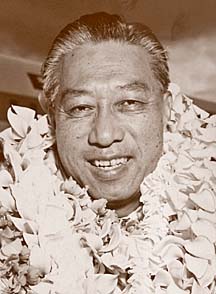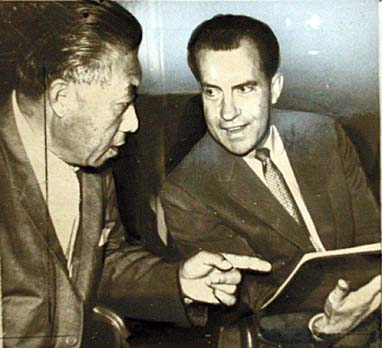
of the Life of Hiram Fong
A good son of Hawaii,
Fong left his mark
on many lives
Editor's note: Hiram Leong Fong, who grew up in Kalihi as a son of impoverished immigrants to become a millionaire tycoon and the first U.S. senator of Asian ancestry, died Wednesday at age 97. The Star-Bulletin asked U.S. District Court Judge Samuel P. King to write a remembrance of his friend.

|
He was a successful candidate for both local and national elective office, and he served loyally in the United States military during World War II. Age took him into the background in recent years, but he was always available to make an appearance or lend a hand if asked. We crossed paths recently and exchanged pleasantries. His mind was working as usual although his body was obviously wasting away.
We met for the first time on the political trail. Hiram was a successful Republican candidate for the Territorial House of Representatives from the then-Fifth Representative District. In the early days, Hailama had his differences with the Republican Party leadership. I usually found myself on his side of the dispute. Whether he noted this or not I do not know, although my experience had been that Hiram was very much aware of what went on around him.
When he became speaker of the Territorial House of Representatives, he approved my retention as attorney for the House. I served in the same capacity in later sessions and finally as executive assistant to the Senate president, Republican "Doc" Hill, which ended with my appointment to a judgeship on the First Circuit Court in Honolulu. Hiram, a Harvard Law School graduate, was the person who had given me, a Yale Law School graduate, the opportunity to demonstrate my abilities.
Hiram was one of Hawaii's first two United States senators. He became the first person of Asian ancestry to be elected to that body. The other person elected was former Gov. Oren E. Long, a Democrat. Since they were elected together in an off year, neither was senior to the other and, for purposes of keeping one-third of senators up for election every two years, they had to be assigned initial terms of five years and three years. Thus it was necessary for them to draw straws to determine first, who would be considered the senior senator from Hawaii, and second, who would serve the longer term. The outcome demonstrated another aspect of Hailama's life: He was lucky. He won both draws.
Senator Fong was a Santa Claus for the racially mixed people of Hawaii. He got himself on the Senate Judiciary Committee from which post he promoted Hawaii's lawyers to important federal courts: Shiro Kashiwa on the Washington-based Court of Claims, which became the Court of Appeals for the Federal Circuit; Herbert Choy on the Ninth Circuit Court of Appeals; Nils Tavares, Dick Yin Wong, Harold Fong, and me on the U.S. District Court for the District of Hawaii.
He was able to place other local persons in many other federal positions. And he had a soft spot in his heart for Hawaiians.
Finding jobs for citizens of Hawaii was only the most visible part of his effectiveness in his almost 17 years in the U.S. Senate. Even after he left the Senate, he retained friends in national office who respected his advice.
The memory of much of the national recognition he obtained for Hawaii is lost in the record books. But there is one piece of federal legislation that still has a life of its own. He joined with Senator Spong of Virginia and Senator Long of Louisiana in a bill dealing with Asian royalties on American music. The bill was promptly dubbed the Spong Fong Long Hong Kong Song bill. It passed.
Hailama was one of a kind. Our aloha goes to Ellyn and the rest of the family and our thanks for letting us have him as long as we did.

|
He was a Republican
before it was cool
Author's note: With the death of former U.S. Sen. Hiram Fong last Wednesday, I wanted Hawaii's people to know more about this wonderful person and why he deserves such high praise.
Hiram Fong was one of the truly legendary figures in recent Hawaiian history. To many of us, he was and always will be, "Mr. Hawaii Republican." But Fong was much more than that when you examine his life and his contributions to contemporary Hawaii.
In 1970, Fong received the National Horatio Alger, Jr. Award because of his exemplification of what the Alger Award stood for -- an award to those men and women who pursued their dreams with determination and perseverance and ultimately became a grand success. Alger's novels described young people who achieved the American dream through self-reliance, self-discipline, decency and honesty. That was certainly Hiram Fong -- an American success story.
Born in Honolulu, the seventh of 11 children of poor, illiterate immigrants from China. His father was an indentured laborer on a sugar plantation and his mother worked as a maid.
Fong did whatever he had to do to survive. He picked algaroba beans, shined shoes, sold newspapers on the street, sold fish and crabs he caught, delivered poi and caddied at a local golf course. He began his schooling at Kalihi-Waena Grammar School. From there, he went to McKinley High School and was a member of the famous McKinley graduating class of 1924. Then it was the University of Hawaii where he served as editor of Ka Leo, the student newspaper, and where he was an outstanding student particularly well known for his ability to speak extemporaneously. After graduation in 1930, Fong worked several years as a clerk in the Suburban Water System (City and County of Honolulu). From there, using the money he had saved, Fong put himself through law school and earned his law degree at Harvard University.
When Fong returned to Hawaii, islanders were facing tough economic times. He worked as a deputy attorney for the City and County. That's when the political bug bit him and he was elected to the Territorial Legislature. Soon he founded his own law firm, Fong, Miho, Choy and Robinson. During World War II, Hiram joined the Army Air Force and was assigned to the Office of the Adjutant General as a reserve lieutenant. Before the war ended he was promoted to major and eventually retired as a reserve lieutenant colonel. Assigned to Hickam, he continued to be active in politics and served 14 years in the Territorial Legislature, six as speaker of the House.
During the post-war years, when a change in Hawaii's political status seemed in the offing, Fong became a member of the Statehood Committee and vice president of the 1950 Hawaii Constitutional Convention.
In 1959, Hiram Leong Fong became the first United States senator of Asia-American ancestry. His first receptionist had been a Miss Hawaii, and she answered all the senator's phone calls with a pleasant "Aloha, Senator Fong's office." Fong always represented the 50th and newest state with dignity and aplomb and earned the respect of his senatorial colleagues.
Fong was re-elected twice and served until 1977. During his long and honorable career in the Senate, he became a good friend of several presidents, especially Richard Nixon. His fellow Hawaii Republicans nominated Fong for president as Hawaii's Favorite Son several times at Republican National Conventions.
As a member of the Senate, Fong advocated and supported such Republican principles as maintaining a strong military presence; free enterprise; free trade and family values. All the while, Fong continued his career as a highly successful businessman who decided to dedicate most of his life to public service.
During his entire tenure in Washington, Fong was the only Republican member of our congressional delegation. Since his years in Washington matched the terms of Republican presidents Nixon and Ford, Fong was critical to seeing that Hawaii's interests were properly represented in the Capitol.
Fong supported American policy in Vietnam because he believed that it was the right thing to do. He knew that communism was a failed system of government that brought its adherents to economic, political and spiritual ruin. America, to him, was the fount of economic and political freedom that allowed nations to prosper and provide for all the needs of its people. But Fong was not only a believer; he was a doer who acted on his beliefs.
When Fong retired from the Senate, his local Republican colleagues begged him to run for governor, but he declined saying only that it was time for someone else to take the lead and pledging to support whomever would take on the challenge. Fong decided to be a gentleman farmer instead. At his plantation and gardens, he always greeted the thousands of tourists and local folks who visited his Windward spread.
Retirement from public view didn't mean total withdrawal from public involvement. In addition to his business interests, Fong had always encouraged others to run for office and freely gave his time and expertise to prospective Republican candidates.
In many ways, Fong was one of James Mitchner's golden people "influenced by both the West and the East ... at home in either the business councils of New York or the philosophical retreats of Kyoto ... wholly modern and American yet in tune with the ancient and the oriental."
Although he once said: "The people of Hawaii would rather vote for a hau tree than they would a Republican," Fong never wavered in his support for the Republican Party and its candidates. He never sacrificed his principles for one moment. He spent most of his 97 years promoting Hawaii and the American dream.
After Hiram Leong Fong, they broke the mold. He was a giant among men, deserving of all the praise that is being heaped upon him with his passing. With all the others who have known him, I will always fondly remember him and with a sad heart extend my condolences to his family and loved ones.